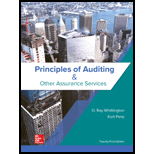
EBK PRINCIPLES OF AUDITING & OTHER ASSU
21st Edition
ISBN: 9781260299434
Author: WHITTINGTON
Publisher: YUZU
expand_more
expand_more
format_list_bulleted
Question
Chapter 17, Problem 13RQ
To determine
Explain whether the client can change the set of financial statements to receive an unmodified opinion instead of qualified opinion for the adequacy of disclosure.
Expert Solution & Answer
Want to see the full answer?
Check out a sample textbook solution
Students have asked these similar questions
Subject. General Account
Bradford Manufacturing has two products: X and Y. The annual production and sales
of Product X is 2,000 units and of Product Y is 1,400 units. The company uses direct
labor-hours as the basis for applying all manufacturing overhead to products.
•
•
Product X requires 0.5 direct labor-hours per unit,
Product Y requires 0.8 direct labor-hours per unit,
The predetermined overhead rate is $72.00 per direct labor-hour.
What is the amount of overhead cost that will be allocated to each unit of Product Y?
General accounting question
Chapter 17 Solutions
EBK PRINCIPLES OF AUDITING & OTHER ASSU
Ch. 17 - Prob. 1RQCh. 17 - What is the function of notes to financial...Ch. 17 - Prob. 3RQCh. 17 - Prob. 4RQCh. 17 - Prob. 5RQCh. 17 - Prob. 6RQCh. 17 - Prob. 7RQCh. 17 - Prob. 8RQCh. 17 - Prob. 9RQCh. 17 - Prob. 10RQ
Ch. 17 - Prob. 11RQCh. 17 - Prob. 12RQCh. 17 - Prob. 13RQCh. 17 - Prob. 14RQCh. 17 - Prob. 15RQCh. 17 - Prob. 16RQCh. 17 - Prob. 17RQCh. 17 - Prob. 18RQCh. 17 - Prob. 19RQCh. 17 - Prob. 20RQCh. 17 - Prob. 21QRACh. 17 - Prob. 22QRACh. 17 - Prob. 23QRACh. 17 - Prob. 24QRACh. 17 - Prob. 25AOQCh. 17 - Prob. 25BOQCh. 17 - Prob. 25COQCh. 17 - Prob. 25DOQCh. 17 - Prob. 25EOQCh. 17 - Prob. 25FOQCh. 17 - Prob. 25GOQCh. 17 - Prob. 25HOQCh. 17 - Prob. 25IOQCh. 17 - Prob. 25JOQCh. 17 - Prob. 25KOQCh. 17 - Prob. 25LOQCh. 17 - Prob. 26OQCh. 17 - Prob. 27OQCh. 17 - Prob. 28OQCh. 17 - Prob. 29OQCh. 17 - Prob. 30OQCh. 17 - Prob. 31OQCh. 17 - Prob. 32OQCh. 17 - Prob. 33PCh. 17 - Prob. 34PCh. 17 - Sturdy Corporation (a nonpublic company) owns and...Ch. 17 - Prob. 36PCh. 17 - Prob. 37PCh. 17 - Prob. 38ITCCh. 17 - Prob. 39ITCCh. 17 - Prob. 40RDC
Knowledge Booster
Similar questions
- Hy expert please provide solution this questionarrow_forwardDanzel Home Goods operates in the household goods industry, where stocks typically have an average P/E ratio of 9.2. Danzel recently reported a net income of $58,000 and has 62,000 shares of common stock outstanding. What is the estimated value of Danzel's stock using this information?arrow_forwardWhat is the estimate value of danzels stock using this information?arrow_forward
arrow_back_ios
SEE MORE QUESTIONS
arrow_forward_ios
Recommended textbooks for you
 Auditing: A Risk Based-Approach to Conducting a Q...AccountingISBN:9781305080577Author:Karla M Johnstone, Audrey A. Gramling, Larry E. RittenbergPublisher:South-Western College Pub
Auditing: A Risk Based-Approach to Conducting a Q...AccountingISBN:9781305080577Author:Karla M Johnstone, Audrey A. Gramling, Larry E. RittenbergPublisher:South-Western College Pub Auditing: A Risk Based-Approach (MindTap Course L...AccountingISBN:9781337619455Author:Karla M Johnstone, Audrey A. Gramling, Larry E. RittenbergPublisher:Cengage LearningBusiness/Professional Ethics Directors/Executives...AccountingISBN:9781337485913Author:BROOKSPublisher:Cengage
Auditing: A Risk Based-Approach (MindTap Course L...AccountingISBN:9781337619455Author:Karla M Johnstone, Audrey A. Gramling, Larry E. RittenbergPublisher:Cengage LearningBusiness/Professional Ethics Directors/Executives...AccountingISBN:9781337485913Author:BROOKSPublisher:Cengage

Auditing: A Risk Based-Approach to Conducting a Q...
Accounting
ISBN:9781305080577
Author:Karla M Johnstone, Audrey A. Gramling, Larry E. Rittenberg
Publisher:South-Western College Pub

Auditing: A Risk Based-Approach (MindTap Course L...
Accounting
ISBN:9781337619455
Author:Karla M Johnstone, Audrey A. Gramling, Larry E. Rittenberg
Publisher:Cengage Learning

Business/Professional Ethics Directors/Executives...
Accounting
ISBN:9781337485913
Author:BROOKS
Publisher:Cengage
